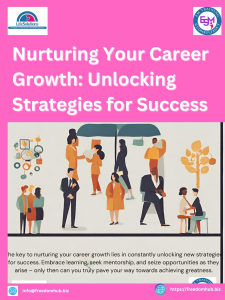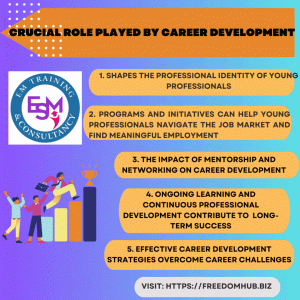 For young professionals, developing their careers is essential because it lays the groundwork for their success in the future. They can discover their strengths and weaknesses, look into various job opportunities, and make wise decisions about their career path by actively participating in career development. By gaining new skills and adjusting to changing trends, it also helps them maintain their competitiveness in a job market that is changing quickly. A strong professional network can be built by young professionals through career development, and they can also learn invaluable industry insights from mentors or peers who have more experience in their field.
For young professionals, developing their careers is essential because it lays the groundwork for their success in the future. They can discover their strengths and weaknesses, look into various job opportunities, and make wise decisions about their career path by actively participating in career development. By gaining new skills and adjusting to changing trends, it also helps them maintain their competitiveness in a job market that is changing quickly. A strong professional network can be built by young professionals through career development, and they can also learn invaluable industry insights from mentors or peers who have more experience in their field.
- Identifying your strengths and weaknesses
The first step in career development is to determine strengths and weaknesses. You can more effectively match your skills and interests with open positions by being aware of where you excel and where you might need to make improvements. Your increased self-awareness will aid in your decision-making regarding the types of jobs and industries that would best suit your skills and interests. Additionally, it assists you in determining areas where you might need to spend money on additional education or training to increase your marketability.
Let’s take the case of a person who is excellent at solving problems and is very interested in technology. With self-awareness, they can recognize potential career opportunities in the technology sector that call for problem-solving abilities, such as software development or IT consulting. In order to improve their marketability and boost their chances of success in their chosen career path, they can then concentrate their efforts on acquiring relevant experience and education in these fields.
An exception to this would be if the person’s expertise in problem-solving was restricted to a particular area of technology, like data analysis or cybersecurity. In this situation, they might only be employable for jobs directly associated with that specialty, and they might have trouble succeeding in other branches of the technology sector. Additionally, if future demand for their specialized problem-solving abilities declines, it may be harder for them to advance in their careers as their marketability may further decline.
Although specializing in a particular area of technology can reduce job opportunities, it can also make people highly sought-after in that area, which could result in career success.
Individuals can deepen their understanding of the unique difficulties and complexity surrounding their niche by becoming authorities in it. They may have an advantage over their competitors thanks to this knowledge, which may also lead to better-paying jobs with greater prestige. Additionally, specializing in a particular niche enables people to continuously hone their abilities and keep abreast of the most recent developments, positioning them as priceless assets to businesses working in that industry. In the end, specialization may come with some risks, but for those who are committed to and passionate about their chosen niche, the potential rewards can greatly outweigh them.
- Exploring different job opportunities
You can develop a better understanding of the abilities and qualifications necessary for various roles by investigating a variety of employment opportunities. This can entail looking up job descriptions, speaking with experts in various fields, or even taking part in internships or job shadowing opportunities. You can broaden your horizons and find potential career paths you might not have thought of before by actively seeking out these opportunities. You can also determine the market demand for your skills and interests by looking into various job opportunities, which will help you make more strategic decisions about your career path.
For instance, a person who has always been interested in art but has never thought of it as a career option might decide to look into job opportunities in the creative industry. They could look up job descriptions for various art-related professions, consult with professional artists and designers, and even take part in internships or job shadowing opportunities at design studios or galleries. They may learn that there is a significant market need for their artistic abilities and interests by actively looking for these opportunities, which might inspire them to pursue a career in the creative industry with confidence. To demonstrate their skills and abilities to potential employers or clients, they might also think about creating a portfolio of their work. This could entail setting up a website or online portfolio, taking part in art competitions or exhibitions, and networking with other industry professionals. They can improve their chances of success and find rewarding career opportunities in the creative field by consistently developing their craft and actively participating in the art community.
Building a portfolio by itself may not guarantee success in the creative field, which depends on factors like market demand and personal style in addition to actively participating in the art community. Making connections and networking within the industry can also be extremely important for success. To improve their chances of long-term success in the creative industry, artists should actively look for opportunities to exhibit their work, collaborate with other professionals, and keep up with current trends and market demands.
- Making informed decisions about your career path
It’s critical to make well-informed choices about your career path. This entails looking into various employment options, comprehending the skills and qualifications needed, and evaluating the industry’s potential for growth and stability. In order to find long-term fulfillment and satisfaction in the creative industry, it is also critical to take personal interests and passions into account when choosing a career path.
Let’s take the case of someone who wants to pursue a career in graphic design. They would look into various career options in the industry, like working for a design firm or as a freelance designer. They would also consider the necessary abilities and credentials, such as mastery of design software and a potent portfolio. They would also evaluate the graphic design sector’s potential stability and growth while taking market demand and technological developments into account.
The oversaturation of the market, however, may be an argument against pursuing a career in graphic design. With more people entering the field, there may be fierce competition for job openings, making it challenging for newcomers to find stable employment. Additionally, the need for human designers may decline due to the potential automation of some graphic design processes by design software and artificial intelligence.
While technological development has produced innovative and more effective design processes, it has also led to a decline in the demand for human designers, potentially limiting job opportunities in the graphic design industry.
The demand for skilled graphic designers may decline as businesses rely more on AI and design software. Due to the limited number of positions available, there may be fierce competition among professionals. As a result, in order to stay current in the field, aspiring graphic designers must constantly update their knowledge and adopt new technologies.
- Staying competitive in a rapidly changing job market
Maintaining competitiveness in a job market that is changing quickly is another important issue in career development. Jobs can quickly change in terms of what they require as industries change and technology advances. To stay ahead of the competition, it is crucial for people to actively look for opportunities for professional development, such as attending workshops or earning new certifications. Additionally, staying informed about new job opportunities and trends can be facilitated by networking and developing strong connections within the industry.
For instance, in the field of software development, it may be challenging for a programmer with only experience in more traditional languages to compete with those who have studied more modern ones, like Python or JavaScript. The programmer can improve their skills and increase their marketability by enrolling in coding workshops and earning certifications in these more recent languages.
It’s crucial to remember that merely learning new programming languages does not ensure employment opportunities. Employers occasionally favor candidates who have a thorough understanding of fundamental programming concepts and strong problem-solving skills over those who only know how to use a particular language.
A programmer’s abilities may be improved by learning new programming languages, but job opportunities also depend on having a solid grasp of fundamental programming concepts and employable problem-solving skills.
- Building a strong professional network
This network may be able to offer helpful direction, counseling, and future employment opportunities. As people gain a better understanding of their interests and passions, career development also promotes personal development and self-confidence, increasing job satisfaction and fulfillment.
A crucial component of business management is incorporating the aforementioned advice and developing a strong network of business contacts. One can gain helpful direction, advice, and future job opportunities by establishing connections with professionals in the industry. Additionally, employers place a high value on having deep understanding of fundamental programming concepts and problem-solving abilities. Greater job satisfaction and personal development may result from this fusion of networking and technical skills.
But even without extensive networking, people can be successful in business management. A person with exceptional technical skills and problem-solving aptitude, for instance, might be able to land job opportunities based solely on their technical proficiency without the need for a sizable professional network. Additionally, rather than relying on networking connections, some people may find greater job satisfaction and personal growth through independent learning and self-improvement.
Even though having exceptional technical skills and problem-solving abilities may help people land jobs, networking can be essential for establishing new business relationships, forming alliances, and getting access to information and resources about the industry that can help managers run their companies successfully in the long run.
Professionals who develop strong networks have access to opportunities and knowledge about the industry that they might not otherwise have. Through networking, people can meet others who share their interests and who can offer helpful advice, encouragement, and mentorship. For those seeking to advance their careers or investigate new industries, this can be especially helpful. In the end, having a strong network in addition to exceptional technical skills can help people advance both professionally and personally.
Conclusion
Finally, career development is critical, particularly early in a professional’s career. One’s career development can be greatly helped by developing a strong network and asking for advice from like-minded people. By utilizing these resources, people can learn more, broaden their knowledge, and take advantage of fresh opportunities that might not have been available otherwise. Therefore, putting time and effort into developing technical skills and networking can help one achieve long-term success and professional fulfillment. Please check out my website and membership site for more resources.



